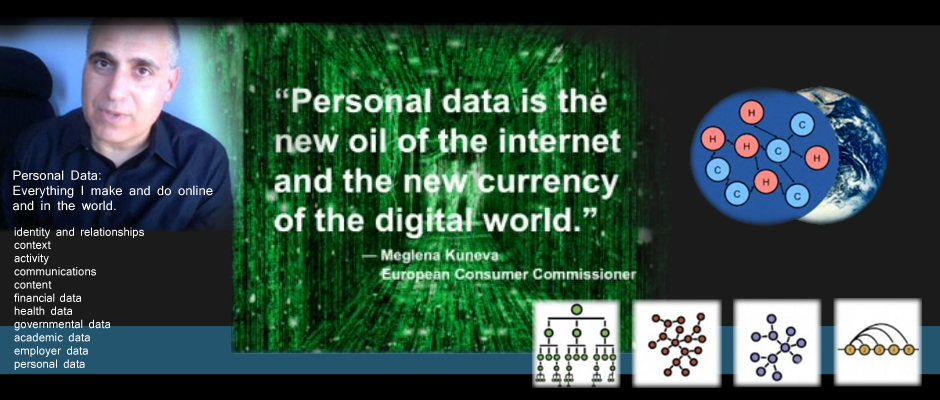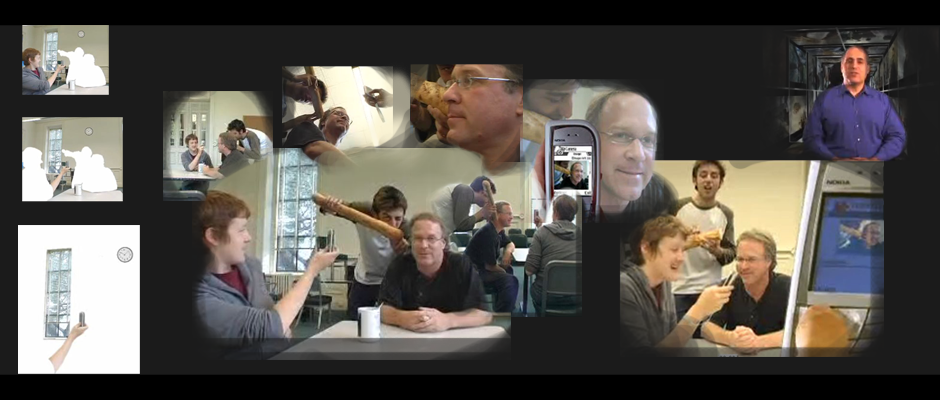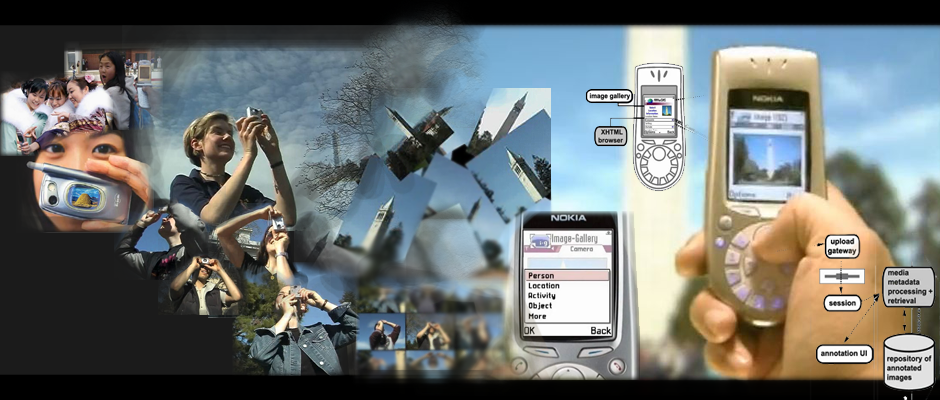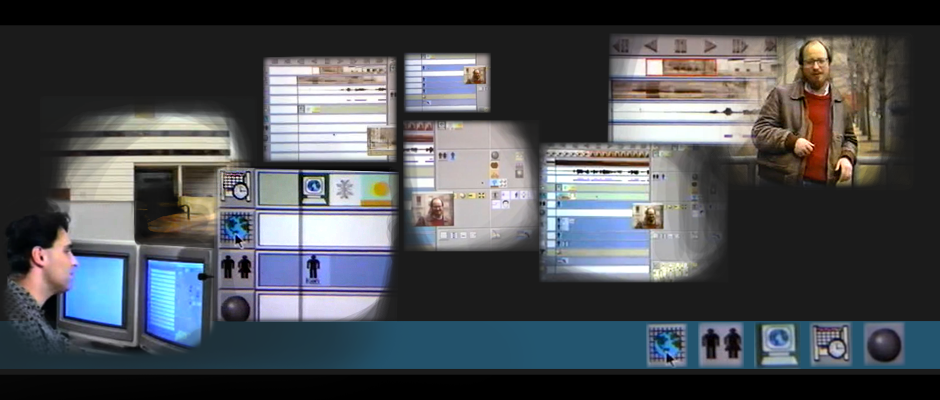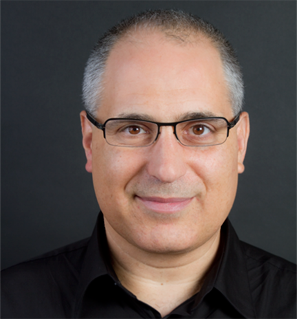Introduction
Hi! Welcome to my website! I’m Marc Davis, an inventor and connector in media and technology.
I invite you to take a look around and enjoy some of my work over the years. You might especially enjoy the videos or my archive of publications and patents. I’ve worked with some great collaborators.
You can also learn more about me on:
And you can find me active on Twitter and LinkedIn. I love to connect on Facebook.
Thanks for stopping by!
Bio
Marc Davis invents mobile, social, media, and personal data technologies that connect people, the web, and the world. With a thirty year career of technology research and development spanning the MIT Media Lab, Interval Research, UC Berkeley, Yahoo!, Invention Arts, and Microsoft, he has done pioneering work in knowledge representation, metadata, multimedia systems, context-aware computing, computer vision, mobile platforms and applications, social media, social search, sociotechnical systems, mobile and social advertising, and personal data technologies and applications. He has transformed his ideas into over 200 granted patents, as well as numerous research prototypes, products, and publications. Marc Davis was a founding member of the World Economic Forum Rethinking Personal Data Project, and has been working to reimagine the technical, legal, and business foundations for our digital society and digital economy, so we can all benefit from having the right and ability to control the uses of our personal data. Based on his background in technology and applied futurism, Marc is currently working on a novel exploring changes in our world and our understanding of ourselves fifty years in the future.
Marc is helping shape the global dialogue on what it means to be a person in our digital societies and digital economies and inventing the technologies and informing the intellectual, policy, and business frameworks that will enable a new “person-centered” personal data ecosystem to emerge that better balances the interests of the private sector, the public sector, and the people. Providing a historically and philosophically informed view of today’s internet, Marc has articulated that in terms of political economy we live in an age of “digital feudalism” that needs to be transformed by a “digital enlightenment” brought about by people reclaiming in the online world the human rights, property rights, speech rights, civil society, and democratic governance we achieved in the physical world. Key to this effort is Marc’s work as a founding member of the World Economic Forum Rethinking Personal Data Project and as a member of the World Economic Forum Global Agenda Council for Data-Driven Development. This year Marc was featured in the World Economic Forum Global Agenda Outlook 2013 report in a dialogue with Robert Madelin moderated by Rod Beckstrom, which articulated the “Thriving in a Hyperconnected World” theme, and Marc was also selected by the European Commission to respond to the their “Onlife Manifesto: Being human in a hyperconnected era” which is part of the EU’s Digital Agenda for Europe.
At Microsoft, Marc was a Partner Architect who worked on the vision and technology strategy for Microsoft’s Online Services Division, especially in the areas of online identity, personal data, privacy, and social computing. Marc and his Early Stage Products (ESP) team developed prototypes to help realize his vision of a “Web of the World” that empowers people by putting them at the center of their digital lives and delivers trusted, personalized services that connect people, the web, and the world in new ways. For example, Marc and his team worked on transforming social search by moving Bing from the “Web of Pages” to the “Web of People” so that searching for almost any topic or interest would return friends and other people specifically relevant to the person doing the query. Based on initial prototypes from Marc’s team, the Bing Sidebar connects searchers to the friends and other people relevant to their searches and enables them to communicate with these relevant people to help them get things done. Another social search prototype conceived and developed by Marc and his team, “Bing Linked Pages” enabled people to easily link web pages that are by or about them to their Facebook identity and have these Linked Pages appear in Bing when people searched for them. Bing Linked Pages was described by ReadWrite as “what Google+ should have been.” Marc and his team were also instrumental at Microsoft in the conception, architecture, prototyping, and development of the platforms underlying Microsoft’s latest efforts to deliver highly personalized information services that use personal and social data with user permission and control.
Before Microsoft, Marc Davis was Chief Scientist at Invention Arts, where he focused on new approaches to how people can better control, share, and benefit from their personal data as well as new methods of strategic intellectual property development. At Invention Arts, Marc consulted to the World Economic Forum and the innovation agency of a European government on the future of personal data banking and exchange.
Before Invention Arts, Marc Davis was Chief Scientist and Vice President of Early Stage Products (ESP) for Yahoo! Mobile, where he and his team invented and helped realize the future of mobile, social, media, monetization, and platforms. While developing a large portfolio of strategic patents and internal prototypes, ESP worked with product teams on innovative products from Yahoo! Mobile such as oneConnect that reinvented mobile communications by aggregating a user’s social networks and communications tools into a socially connected address book. Marc Davis was also a key contributor to the Yahoo! Open Strategy (Y!OS) for making Yahoo!’s platforms and products more open and social, as well as the vision demo for the future of Yahoo! shown at CES 2008. In 2005, Marc Davis worked with Yahoo! and UC Berkeley to launch Yahoo! Research Berkeley, which produced a number of breakthrough public prototypes in mobile media and social media: ZoneTag, context-aware mobile photo capture and tagging software; TagMaps, a collective map of human attention created by analyzing the millions of geocoded Flickr photos; Zurfer, a context-aware mobile photo browser; and Remixer, a web-based video remixing tool developed for the San Francisco International Film Festival.
From 2002 to 2006, Marc Davis served as Assistant Professor at the UC Berkeley School of Information where he directed Garage Cinema Research whose projects included: Mobile Media Metadata (context-aware mobile media technology and applications that leverage contextual metadata—spatial, temporal and social—to infer media content and support media tagging, sharing, and reuse, including pioneering work in context-aware mobile face and place recognition); the Social Uses of Personal Media (social science and design research to learn how and why people use digital imaging in order to support the design of next generation mobile media applications); Media Streams Metadata Exchange (media metadata framework for annotating, retrieving, sharing, and remixing video on the Web); Active Capture (interactive cameras that use signal processing and computer-human interaction to capture high quality, reusable, annotated media assets); and Adaptive Media (adaptive media templates and automatic editing functions to mass customize and personalize media). Garage Cinema Research worked on its projects with many sponsors including British Telecom, Hewlett-Packard, France Telecom, Nokia, Ricoh Innovations, AT&T, Opera Software, TEKES, and the UC Discovery Grant for Digital Media. At UC Berkeley, Marc Davis was also a Co-Founder and Executive Committee Member of the interdisciplinary UC Berkeley Center for New Media, an Advisory Board Member of the Art, Technology, and Culture Colloquium, and an Affiliated Faculty Member of the Berkeley Institute of Design.
From 1999 to 2002, Marc Davis was Chairman and Chief Technology Officer of Amova, Inc., a developer of media automation and personalization technology that developed patented personalized video advertising systems and formats. From 1993 to 1998, Marc Davis was a researcher and project coordinator at Interval Research, where he led research and development teams in creating patented automatic digital video production technology that automated direction, cinematography, editing, and remixing. In recognition of his thought leadership in multimedia computing, in 1997, Marc was an invited contributor to the “The Next 50 Years: Our Hopes, Our Visions, Our Plans” edition of the Communications of the ACM, for which he wrote a vision piece about the next 50 years of media technology.
From 1990 to 1995, Marc Davis did his doctoral work at the MIT Media Laboratory, where he developed Media Streams, an iconic visual language system for annotating, retrieving, and remixing digital video. At the MIT Media Laboratory, he also co-founded the Narrative Intelligence Reading Group, which innovated interdisciplinary discourse, theory, and practice at the intersection of literary and media theory, artificial intelligence, and media technology and design. In 2003, “Narrative Intelligence” was recognized by the National Academy of Sciences as one of its “promising areas for transdisciplinary work.”
Marc’s invention and patent work has been at least a decade ahead of its time, widely impactful in the industry, and covers key aspects of how the web works today and what our digital lives may be like in the future. For example, Marc is an inventor on two of the four patents that Paul Allen, co-founder of Microsoft and founder of Interval Research, is using in a patent lawsuit with eleven leading web companies. These inventions from the mid-1990s are claimed to be “fundamental to the ways that leading e-commerce and search companies operate today.” Much of Marc’s invention, and prolific, fundamental patent work at Yahoo! was focused on the technologies and applications at the core of the mobile social “Web of the World” we are now starting to live in. As observed in an insightful article about Marc’s “AttentionRank” patent, it appears to cover “everything that can be found on the Web as well as anything (any real world entity) that can be connected somehow to the internet.”
Marc Davis’ ideas and work have been featured in major publications such as the New York Times, San Jose Mercury News, Atlantic Monthly, TechCrunch, GigaOm, AllThingsD, SearchEngineLand, Huffington Post, Forbes, BBC News, CNET, ZDNet, ReadWrite, O’Reilly Radar, CMSWire, The Street, Popular Mechanics, San Francisco Chronicle, and Business Week. He gives talks at leading conferences around the world such as SXSW, privacy identity innovation, Telco 2.0, Mobilize, Mobile Monday, MIT Futures of Entertainment, and the Stanford People, Computers, and Design Seminar. Several influential books have featured Marc Davis’ work including: Smarter Than You Think: How Technology is Changing Our Minds for the Better; The Long Tail: Why the Future of Business is Selling Less of More; Mobile Nation: Creating Methodologies for Mobile Platforms; Narrative Intelligence; Beyond Productivity: Information, Technology, Innovation, and Creativity; Routledge Encyclopedia of Narrative Theory; and Readings in Human-Computer Interaction: Toward the Year 2000.
Marc Davis earned his B.A. in the College of Letters at Wesleyan University, his M.A. in Literary Theory and Philosophy at the University of Konstanz in Germany on a German Academic Exchange Service Fellowship, and his Ph.D. in Media Arts and Sciences at the Massachusetts Institute of Technology Media Laboratory.
Additional information, including status updates, blog posts, upcoming speaking events, publications, and videos by and about Marc Davis are available at https://marcdavis.me, Twitter, Facebook, LinkedIn, Google+, Vimeo, YouTube, Klout, Pinterest, and SlideShare.
